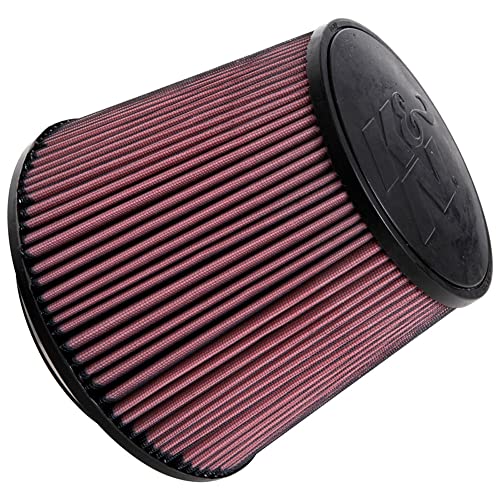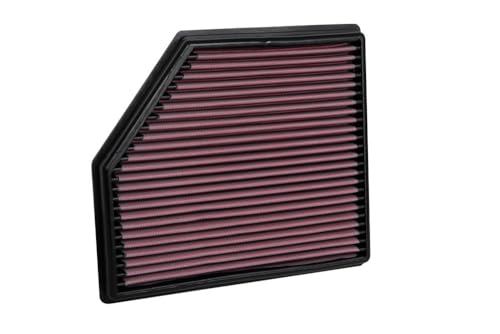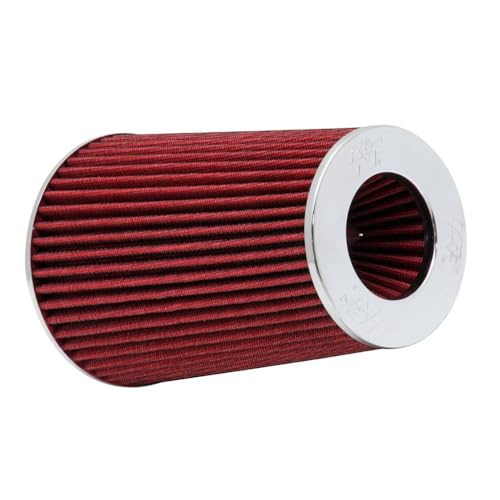Car engines need clean air for optimal performance, just like we do! That’s where air filters come in. They act as a barrier, trapping dust, dirt, and other debris before it enters the engine. A clean air filter allows for smoother operation and can even improve fuel efficiency.
In fact, several studies have shown that certain performance air filters improve car performance. One such study was conducted by three academics and published in a very reputable academic journal has this to say:
Acceleration and fuel economy tests reveal that vehicles with new filters perform slightly better than with clogged ones, and K&N filters slightly outperform OEM filters in these aspects.
ScienceDirect (Accessed 2024)
K&N air filters are known for their focus on performance. They claim to improve airflow, leading to potential horsepower gains. However, there’s also the question of cost and potential trade-offs. This article dives into whether the advertised benefits of K&N filters justify their price tag.
We’ll explore the claimed advantages of K&N filters, weigh them against potential drawbacks, and analyze real-world testing results. Finally, we’ll consider your specific needs as a driver to help you decide if K&N filters are the right choice for you.

Advertised Benefits of K&N Filters:
K&N air filters boast several key selling points that attract performance-oriented drivers:
- Improved Airflow: K&N filters use a oiled gauze design that allows for higher airflow compared to traditional paper filters. This theoretically allows the engine to breathe easier, potentially leading to Horsepower Gains. Increased airflow can, in theory, contribute to a slight increase in horsepower, especially at higher RPMs.
- Reusability: Unlike disposable paper filters, K&N filters are designed to be cleaned and re-oiled, saving you money on replacements in the long run. This is especially one of the selling points that make it worth buy, over other OEMs.
You Might Enjoy: How do dash cams work? And why you should get one
Potential Drawbacks of K&N Filters:
While K&N filters offer potential performance benefits, there are also some drawbacks to consider:
- Less Efficient Filtration: The focus on airflow can come at the expense of filtration efficiency. Some studies suggest K&N filters may allow more microscopic dirt particles to pass through compared to paper filters. This could lead to increased engine wear over time. The study mentioned above pointed this out.
- Increased Maintenance: Unlike disposable filters, K&N filters require periodic cleaning and re-oiling for optimal performance. This can be a messy process and requires purchasing a separate cleaning kit. But ultimately, I think this is more of an advantage than a disadvantage.
- Minimal Power Gains for Everyday Driving: The advertised horsepower gains from K&N filters are often minimal and may not be noticeable for everyday driving. You’re more likely to see a benefit if your car is modified for performance or driven very hard.
Performance Tests and Reviews: Unveiling the Reality
Independent dyno tests and reviews offer valuable insights into the real-world performance of K&N filters. Here’s a glimpse of what we found:
- Horsepower Gains: While K&N advertises horsepower increases, independent dyno tests often show minimal gains, particularly for stock vehicles. Gains, if any, tend to be in the range of a few horsepower, which may not be noticeable in everyday driving.
- Fuel Economy: Similar to horsepower claims, there’s mixed evidence regarding fuel economy benefits. Some user reviews, like the one we mentioned earlier about the Expedition, report noticeable improvements. However, controlled tests often show minimal to no change in fuel economy with K&N filters.
I tested the average mileage of my expedition before and after the placement of the KnL air filter and noticed that the filter improved the average mileage per gallon by an average of 3 to 4 miles per gallon which it makes a big difference in gas consumption. With the new filter my vehicle achieves between 24 and 25 miles per gallon in the highway and 19 to 20 miles per gallon on city traffic. My vehicle is an Expedition Max Platinum 4×4!
Verified Buyer on Amazon
It’s important to remember that results can vary depending on factors like the specific car model, driving conditions, and even the dyno machine used for testing.
Cost Comparison: Striking a Balance
K&N filters typically cost more upfront compared to standard paper filters. However, since they’re reusable, the cost can even out over time, especially if you keep your car for a long period. Here’s a breakdown:
- K&N Filters: Higher initial cost, but reusable with proper cleaning and re-oiling.
- Standard Paper Filters: Lower initial cost, but need to be replaced regularly (often every 12,000-15,000 miles).
The Verdict: Are K&N Filters Worth It?
The decision boils down to your driving style, car modifications, and budget:
- Performance Enthusiasts: If you have a modified car and prioritize maximizing power at higher RPMs, a K&N filter might be worth considering. However, the gains may be subtle.
- Daily Commuters: For everyday driving with a stock vehicle, the minimal performance gains and potential filtration drawbacks of K&N filters likely don’t outweigh the convenience and affordability of standard paper filters.
Here are some additional factors to consider:
- Maintenance: Are you comfortable with the cleaning and re-oiling process required for K&N filters?
- Driving Conditions: Do you drive in dusty environments where a more efficient filter might be beneficial?
Conclusion: K&N Filters verdict
K&N filters offer a unique proposition for drivers seeking potential performance gains. However, these gains are often minimal for everyday driving, and there are potential trade-offs in filtration efficiency and maintenance requirements.
For most commuters with stock vehicles, standard paper filters remain a cost-effective and convenient choice. K&N filters might hold more appeal for performance enthusiasts with modified cars, but even then, careful consideration of the trade-offs is crucial.
Overall, air filters actually make your car performance better, but the decision to buy the high end expensive ones boils down to driving style. Personally, I’d buy it, even though i know i am not getting as much power as is written on the pack. The durability and the extended life time makes it worth it for me; the extra performance promised is just an icing on the cake.











2 thoughts on “K&N Air Filters Put to the Test: Are the Performance Gains Worth the Cost?”